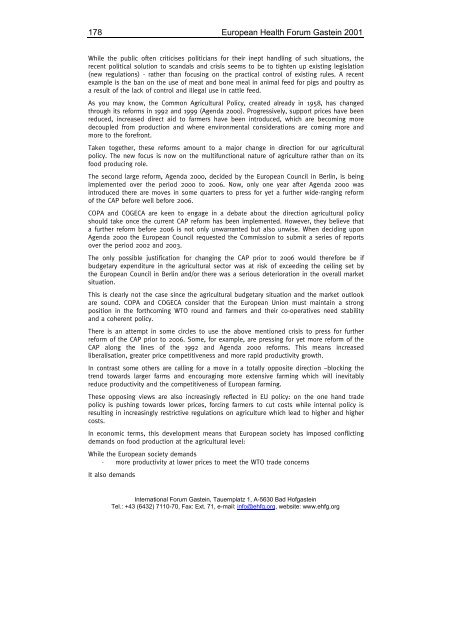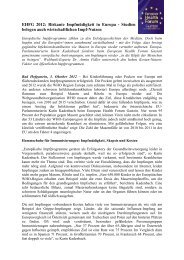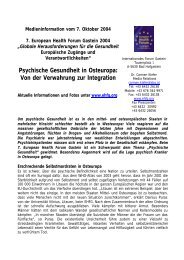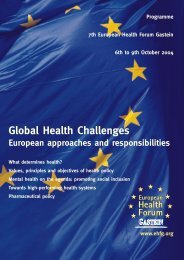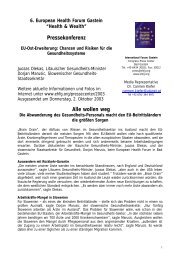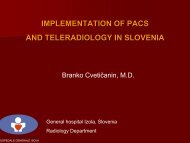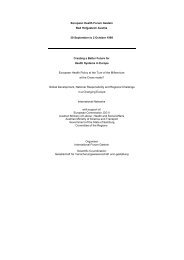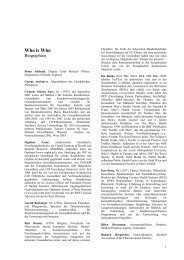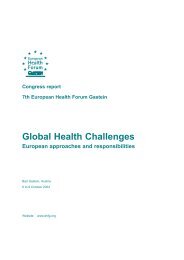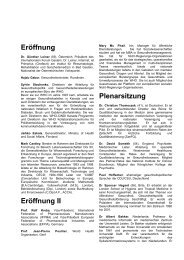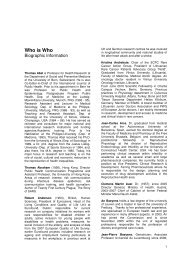Congress report - European Health Forum Gastein
Congress report - European Health Forum Gastein
Congress report - European Health Forum Gastein
You also want an ePaper? Increase the reach of your titles
YUMPU automatically turns print PDFs into web optimized ePapers that Google loves.
178<br />
<strong>European</strong> <strong>Health</strong> <strong>Forum</strong> <strong>Gastein</strong> 2001<br />
While the public often criticises politicians for their inept handling of such situations, the<br />
recent political solution to scandals and crisis seems to be to tighten up existing legislation<br />
(new regulations) - rather than focusing on the practical control of existing rules. A recent<br />
example is the ban on the use of meat and bone meal in animal feed for pigs and poultry as<br />
a result of the lack of control and illegal use in cattle feed.<br />
As you may know, the Common Agricultural Policy, created already in 1958, has changed<br />
through its reforms in 1992 and 1999 (Agenda 2000). Progressively, support prices have been<br />
reduced, increased direct aid to farmers have been introduced, which are becoming more<br />
decoupled from production and where environmental considerations are coming more and<br />
more to the forefront.<br />
Taken together, these reforms amount to a major change in direction for our agricultural<br />
policy. The new focus is now on the multifunctional nature of agriculture rather than on its<br />
food producing role.<br />
The second large reform, Agenda 2000, decided by the <strong>European</strong> Council in Berlin, is being<br />
implemented over the period 2000 to 2006. Now, only one year after Agenda 2000 was<br />
introduced there are moves in some quarters to press for yet a further wide-ranging reform<br />
of the CAP before well before 2006.<br />
COPA and COGECA are keen to engage in a debate about the direction agricultural policy<br />
should take once the current CAP reform has been implemented. However, they believe that<br />
a further reform before 2006 is not only unwarranted but also unwise. When deciding upon<br />
Agenda 2000 the <strong>European</strong> Council requested the Commission to submit a series of <strong>report</strong>s<br />
over the period 2002 and 2003.<br />
The only possible justification for changing the CAP prior to 2006 would therefore be if<br />
budgetary expenditure in the agricultural sector was at risk of exceeding the ceiling set by<br />
the <strong>European</strong> Council in Berlin and/or there was a serious deterioration in the overall market<br />
situation.<br />
This is clearly not the case since the agricultural budgetary situation and the market outlook<br />
are sound. COPA and COGECA consider that the <strong>European</strong> Union must maintain a strong<br />
position in the forthcoming WTO round and farmers and their co-operatives need stability<br />
and a coherent policy.<br />
There is an attempt in some circles to use the above mentioned crisis to press for further<br />
reform of the CAP prior to 2006. Some, for example, are pressing for yet more reform of the<br />
CAP along the lines of the 1992 and Agenda 2000 reforms. This means increased<br />
liberalisation, greater price competitiveness and more rapid productivity growth.<br />
In contrast some others are calling for a move in a totally opposite direction –blocking the<br />
trend towards larger farms and encouraging more extensive farming which will inevitably<br />
reduce productivity and the competitiveness of <strong>European</strong> farming.<br />
These opposing views are also increasingly reflected in EU policy: on the one hand trade<br />
policy is pushing towards lower prices, forcing farmers to cut costs while internal policy is<br />
resulting in increasingly restrictive regulations on agriculture which lead to higher and higher<br />
costs.<br />
In economic terms, this development means that <strong>European</strong> society has imposed conflicting<br />
demands on food production at the agricultural level:<br />
While the <strong>European</strong> society demands<br />
- more productivity at lower prices to meet the WTO trade concerns<br />
It also demands<br />
International <strong>Forum</strong> <strong>Gastein</strong>, Tauernplatz 1, A-5630 Bad Hofgastein<br />
Tel.: +43 (6432) 7110-70, Fax: Ext. 71, e-mail: info@ehfg.org, website: www.ehfg.org


